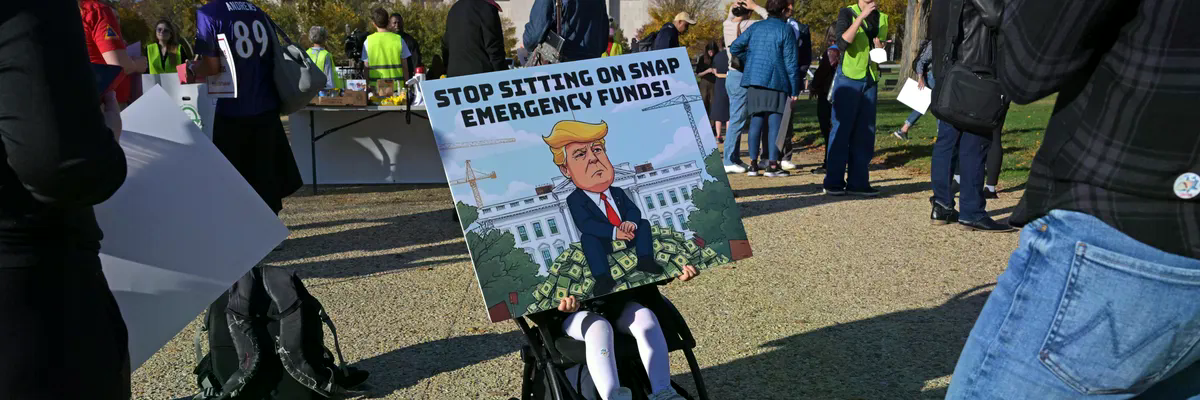
Two federal judges have ruled that the Trump administration cannot suspend food assistance for 42 million Americans during the government shutdown. However, as of Saturday, when payments were due to be disbursed, President Donald Trump appeared to defy the court’s decision, potentially leaving millions unable to afford their monthly groceries.
On Friday, a Massachusetts federal judge and a Rhode Island federal judge issued rulings against the Department of Agriculture’s (USDA) decision to freeze benefits from the Supplemental Nutrition Assistance Program (SNAP), also known as food stamps. The judges determined that the freeze was unlawful and ordered the USDA to use $6 billion in contingency funds to cover at least part of the approximately $8 billion in benefits scheduled for disbursement this month.
In his oral ruling, U.S. District Judge James R. McConnell of Rhode Island emphasized that the contingency funds are appropriated money necessary for the operation of the program. “The shutdown of the government through funding doesn’t do away with SNAP. It just does away with the funding of it,” he stated. “There could be no greater necessity than the prohibition across the board of funds for the program’s operations.”
McConnell further warned of potential harm, saying, “There is no doubt, and it is beyond argument, that irreparable harm will begin to occur if it hasn’t already occurred in the terror it has caused some people about the availability of funding for food for their family.”
SNAP benefits are available to individuals whose monthly incomes fall below 130% of the federal poverty line. More than one in eight Americans rely on the program, with 39% of beneficiaries being children. According to USDA research cited by the Washington Post, those receiving SNAP benefits depend on it for 63% of their groceries, with the poorest recipients relying on it for up to 80%.
Judge McConnell rejected the administration’s claim that the contingency funds might be needed for other emergencies, stating, “It’s clear that when compared to the millions of people that will go without funds for food versus the agency’s desire not to use contingency funds in case there’s a hurricane need, the balances of those equities clearly goes on the side of ensuring that people are fed.”
While Judge Indira Talwani of Massachusetts ruled that the administration should use the contingency funds to support as much of the program as possible, Judge McConnell went further, ordering the department to tap additional funding sources to fully disburse benefits “as soon as possible.” Both judges gave the administration until Monday to provide an update on its plan for compliance.
Despite the rulings, President Trump claimed on social media that “government lawyers do not think we have the legal authority to pay SNAP with certain monies we have available,” and that two courts had issued conflicting opinions. He added, “I do NOT want Americans to go hungry just because the Radical Democrats refuse to do the right thing and REOPEN THE GOVERNMENT.”
Attorney and activist Miles Mogulescu noted that, until recently, the Trump administration had acknowledged that contingency funds should be used to continue SNAP payments during the shutdown. On September 30, the day before the shutdown began, the USDA posted a 55-page “Lapse of Funding” plan stating that the department would continue operations related to core nutrition safety net programs. However, the file was later deleted, and a new memo was released claiming that 42 million individuals would not receive benefits in November due to Congressional Democrats’ refusal to pass a clean continuing resolution.
Mogulescu criticized the memo for lacking legal support, noting that it fabricated a rule stating that “the contingency fund is not available to support FY 2026 regular benefits, because the appropriation for regular benefits no longer exist.”
Sharon Parrott, president of the Center on Budget and Policy Priorities, called the administration’s claims “unequivocally false,” stating that the federal government has the authority to distribute SNAP benefits during a shutdown. She added that the administration had admitted the reserves were available for use and could have acted weeks ago to ensure payments.
Parrott emphasized that even a slight delay in benefits is better than no support at all, and accused the administration of withholding funds for political gain.
Republicans have used the shutdown to pressure Democrats to abandon demands for extending a critical Affordable Care Act tax credit, aiming to prevent health insurance premiums from rising for over 20 million Americans. Meanwhile, Trump has attempted mass layoffs of government workers, which were halted by a federal judge, and his Office of Management and Budget director, Russell Vought, has redirected funding from infrastructure projects in blue states and cities.
David Super, a constitutional law professor at Georgetown University, called the suspension of SNAP “a choice, and an overtly unlawful one at that.” He argued that the administration is using food assistance as a bargaining chip to force Democrats into negotiations.


